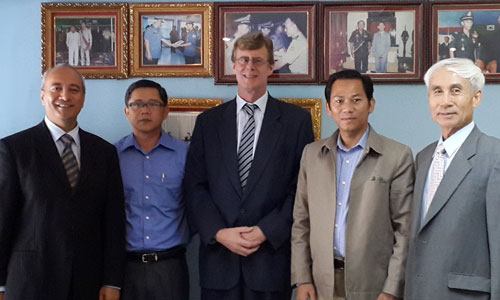A legally sound digital future begins not with technology, but with trust—and that trust is built through the right laws, systems, and partnerships.
— Korea —
innovative. inclusive. foundational.












Bridging Legal Foundations: Adapting Korea’s e‑Government Model for Cambodia’s Digital Future
"Digital transformation is not a luxury—it is a necessity for emerging economies to create inclusive, transparent, and responsive governance structures."
—"Digital transformation is not a luxury—it is a necessity for emerging economies to create inclusive, transparent, and responsive governance structures."
Challenge
Between 2013 and 2014, Cambodia stood at a pivotal point in its efforts to modernize public administration. Although significant progress had been made in economic growth, public service delivery remained fragmented, manual, and opaque.
The Cambodian government, particularly the Ministry of Economy and Finance, recognized the urgent need for digitally enabled governance systems to improve efficiency, reduce corruption, and expand access for citizens and businesses alike. However, Cambodia faced key barriers to e- Government implementation:
- A weak legal infrastructure for digital transactions and online services, including an incomplete e‑Commerce Law and outdated telecommunications regulations.
- Low inter-ministerial coordination and limited technical capacity within government agencies.
- A financial sector heavily reliant on real property as collateral, but lacking digital systems to verify, record, and securitize such assets.
- Limited access to cost-effective international models that could be adapted to Cambodia’s legal and institutional environment.
Strategy
To address these barriers, GG International—through its international legal advisor Shaan Stevens—was engaged by Shin HWA Logics Co. of Korea to lead a pre-feasibility study focused on adapting Korea’s successful e‑Government framework to the Cambodian context. The project strategy included:
- Stakeholder engagement with the Ministry of Economy and Finance and key regulators to align national priorities.
- Comparative legal review of Cambodian draft legislation, including the e‑Commerce Law and telecommunications framework, benchmarked against Korea’s integrated e‑Government legal system.
- Evaluation of real property securitization practices in Cambodia, particularly their intersection with digital lending records and the enforceability of online transactions in the private financial sector.
- Recommendation of a phased implementation roadmap, prioritizing:
- Digital property and identity registries.
- Inter-agency data sharing protocols.
- Enabling legislation for digital contracts and authentication.
- Identification of Korean technologies and institutional practices suitable for localized adoption, with an emphasis on affordability and scalability.
Transformation
The project delivered a comprehensive legal and regulatory roadmap for implementing an e‑Government strategy in Cambodia that draws upon Korea’s tested systems but is grounded in local legal realities. Key results included:
- A clear identification of legal gaps and actionable reforms to support Cambodia’s digital transition.
- Structured recommendations on how to digitize the interface between property rights and loan securitization, unlocking wider access to finance.
- A validated proposal for public-private partnerships to finance and roll out e‑Government services in stages, beginning with priority agencies such as land registration and commerce.
Most importantly, the study provided the Cambodian government with a realistic, legally grounded, and economically viable framework for achieving digital governance